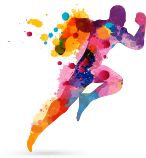Why Sport/Performance Psychology?
The psychological preparedness of the athlete (or artist) is often what makes the difference between excelling, a good performance or underperforming. Performance psychology can assist the athlete to perform at his/her best when it matters the most. The general aim of performance psychology is to get into “the zone” where there is a free flow of energy and connectedness between body and mind. The saying “Where the mind goes, everything follows” is all the more true in sport.
Why is mental training or psychological preparation overlooked?

The psychological preparation of an athlete is difficult because it is intangible and invisible. It is often easier to work with the visible for example changing technique than what it is to work with or develop the psychological aspect of an athlete. It may therefore require and expert in his/her field such as a performance psychologist that can work with the athlete and coach to develop or address specific psychological aspects of the athlete.
What is sport psychology?
Sport psychology has basically two functions:
- To remove obstacles in the way of performance. An obstacle is anything that takes mental energy, preventing you from performing optimally for example stressing too much.
- To enhance performance. Through training the mind and applying techniques, performance can be taken to a higher level.
Various skills and techniques can be learned as part of training the mind. Some of these include:
- Goal setting
- Learning a specific way of thinking or frame of mind
- Setting sport and life goals
- Distinguish between target and process goals
- Motivation
- Internal motivators
- External motivators
- Stress and pressure
- Ideal state of arousal – not over or under excited
- Relaxation – physically and mentally
- Dealing with distracters that interfere with focus and concentration
- Internal distracters such as thinking patterns and how to deal with them
- External distracters such as crowds and how to use it positively.
- Visualization and imagery – visualization is a powerful technique to enhance performance
All skills and techniques must be adapted to the athlete and the specific sport.
What is sport psychology?
Sport psychology has basically two functions:
-
To remove obstacles in the way of performance. An obstacle is anything that takes mental energy, preventing you from performing optimally for example stressing too much.
-
To enhance performance. Through training the mind and applying techniques, performance can be taken to a higher level.
Various skills and techniques can be learned as part of training the mind. Some of these include:
- Goal setting
- Learning a specific way of thinking or frame of mind
- Setting sport and life goals
- Distinguish between target and process goals
- Motivation
- Internal motivators
- External motivators
- Stress and pressure
-
Ideal state of arousal – not over or under excited
-
Relaxation – physically and mentally
-
Dealing with distracters that interfere with focus and concentration
-
Internal distracters such as thinking patterns and how to deal with them
-
External distracters such as crowds and how to use it positively.
-
Visualization and imagery – visualization is a powerful technique to enhance performance
All skills and techniques must be adapted to the athlete and the specific sport.
Services offered
The relationship between the sport psychologist and the athlete is an important factor for successful mental training. The athlete should choose a sport psychologist whom he or she thinks has the necessary experience and expertise and whom they can relate to (see personal profile).
- Individual sessions
A typical first individual session could include: determining areas of improvement, designing a strategy to improve these areas and a plan to improve mental strength. Pre-competition sessions specifically focus on the competition and how to deal with the big moment, distractors, nerves etc. Post competition sessions evaluate the effectiveness of mental strategies and identify areas of improvement. A few sessions are usually initially required when the athlete has not had contact with a sport psychologist before. Individual sessions (between 4 and 6) should set you on the right path. Thereafter appointments can be made on an ad hoc basis as required. - Team consultations
A team can consult a psychologist to help them with something very specific or there could be more extended involvement over a period of time. The second option is in my opinion the better one where the psychologist gets to know the coaches, athletes and management and where there is regular contact with the team. Both team dynamics and psychological skills could be addressed. - Sport Psychology Workshops
Workshops are usually facilitated around a specific theme or a specific event. A once-off workshop for example can be held to help the team prepare for an upcoming tour or big event. A workshop with coaches can also be held to assist the coaches with the mental preparation of their athletes. - Sports talks
Talks are aimed at informing athletes, coaches and parents about sport psychology, mental skills and appropriate behaviour. The duration of talks is between 1 and 2 hours. The theme of the talk will be determined by the target group and objectives.
Contact Greyling
Tel: 084 086 0511 (Call, WhatsApp or SMS)
Email: g_viljoen@mweb.co.za
Address: 342 Albert Street, Waterkloof, Pretoria
